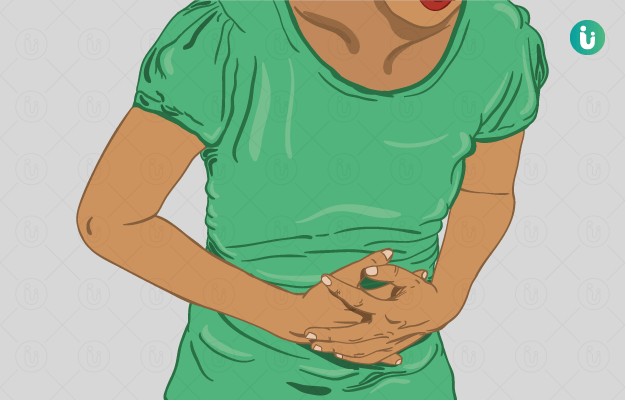What are abdominal cramps?
Abdominal cramps are a pain in any area below the chest and above the pelvic region. Cramps occur when muscle contractions become painful. Cramps are very common and everyone has experienced them at least once in their lifetime. Their intensity and frequency depend upon the underlying cause.
What are the main associated signs and symptoms?
- Mild symptoms associated with cramps
- Indigestion and discomfort while eating.
- Constipation or diarrhoea.
- Belching and flatulence or stomach gas.
- Heartburn or acidity and vomiting.
- Fever, if it is due to a microbial infection.
- Severe symptoms of abdominal cramps
- Painful urination and bowel movements.
- Blood in the urine or stool.
- Dehydration.
- Loss of appetite and severe weight loss.
Are you also troubled by obesity and are not able to lose weight even after a lot of efforts, then start using myUpchar Ayurveda Medarodh Weight Control Tablet today and control your weight.
What are the main causes?
A cramp is caused due to an underlying medical condition associated with the stomach, liver, kidney, pancreas, or any other organ located in the abdomen. The causes range from mild infections to more severe diseases, such as cancer. The common causes of abdominal cramps include:
- Infections and inflammation (swelling) of the stomach due to food poisoning.
- Vomiting and gastroesophageal reflux disease (a condition in which the stomach contents flow back into the food pipe).
- Period pain.
- Lactose intolerance (inability to digest lactose or milk sugar).
- Kidney stone or gallstones.
- Irritable bowel syndrome (inflammation of the gut).
- Appendicitis.
- Gastric or stomach ulcers.
- Cancer of the stomach or colon
How is it diagnosed and treated?
Diagnosing the cause of the cramps is crucial to employ the correct and efficient line of treatment. Based on the type, intensity, frequency of pain, and other associated symptoms, your doctor will narrow down the possible causes of the abdominal cramps.
The diagnosis can be done by the following tests:
- Blood investigation to check for infections.
- Urine and stool investigation for microbes, blood in the urine, pus discharge, and more.
- X-ray of the abdomen to check for gallstones or kidney stones.
- Endoscopy to check for any obstructions in the stomach or small intestine.
- Colonoscopy to assess colon health.
- Computerised tomography or CT scan.
- Ultrasound.
The treatment of the cramps varies greatly based on the cause and may include the following:
- For infections or inflammation, your doctor will give you medicines and recommend a modification in diet.
- If there is an obstruction in any organ, surgery is scheduled to remove the blockage.
- Cancer treatment requires a more extensive approach involving chemotherapy and radiotherapy in addition to surgery. This depends upon the location and extent of the malignancy or cancer.
Self-care for abdominal cramps
Although the treatment differs according to the cause, there are some basic steps you can take to ease your discomfort. These are:
- Avoid eating acidic and spicy food. This increases irritation in your stomach and intestinal lining.
- Drink plenty of water and consume large quantities of fluids. However, avoid carbonated beverages that produce excess gas.
- Do not eat anything heavy right before bed-time. Allow at least two hours for digestion before you sleep.
- Avoid strenuous exercise of the abdominal muscles.
(Get online doctor consultation for any health issue)

 Doctors for Abdominal Cramps
Doctors for Abdominal Cramps  OTC Medicines for Abdominal Cramps
OTC Medicines for Abdominal Cramps
 Lab tests for Abdominal Cramps
Lab tests for Abdominal Cramps


















